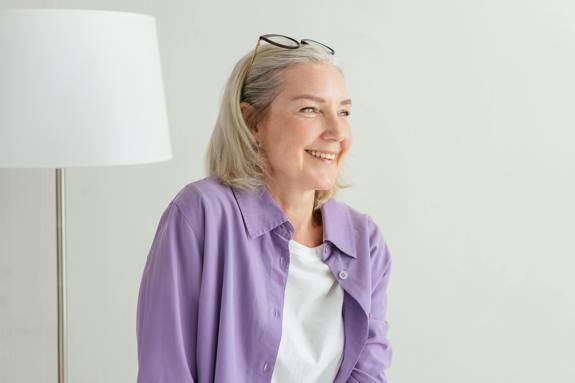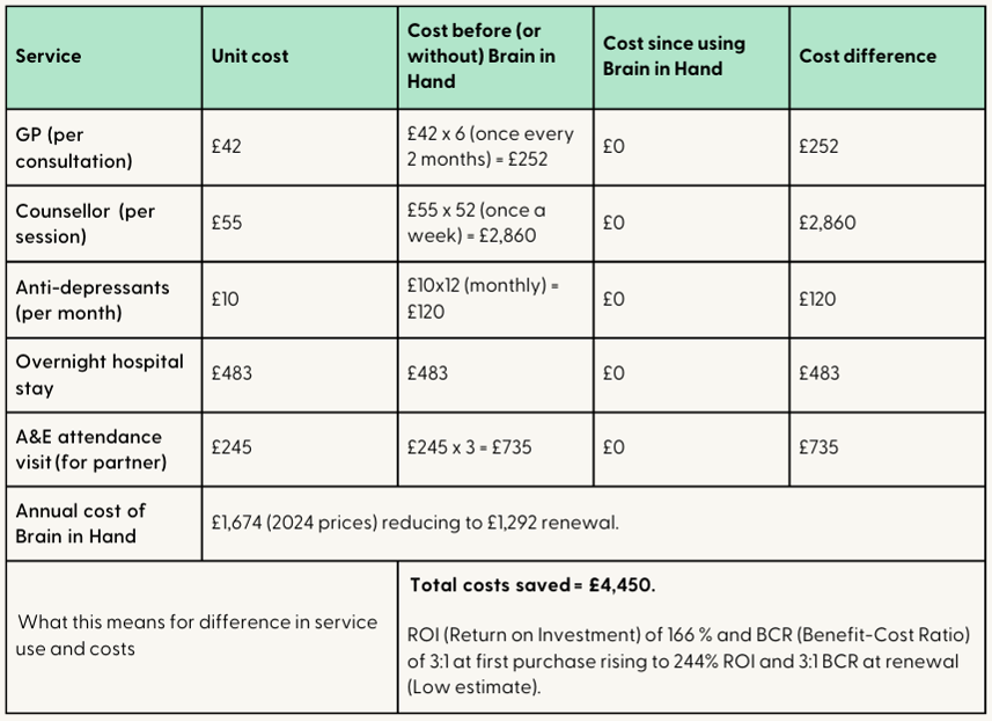Brain in Hand helps Katie thrive

Katie (she/they), who identifies as autistic, has been using Brain in Hand (BiH) for approximately 18 months. Katie experiences anxiety and is immuno-suppressed because of diagnoses of Crohn's disease and arthritis.
Besides working full-time, Katie serves as a caregiver for both their mother and her partner, who faces mental health challenges.
Katie lives with her partner, who is their primary support system. Having grown children who no longer live at home, Katie finds Brain in Hand a valuable tool that offers support in various ways.
Brain in Hand helps Katie manage their physical health in several ways. It reminds them to take HRT medication and the medicine they needs for ongoing health conditions.
Since Katie needs to take these medications at specific times, the reminders prevent them from missing doses and reduce the chance of side effects or complications. Brain in Hand also prompts Katie to complete their physical therapy, supporting their overall health and ability to perform their job.
"I've got to self-medicate a lot of the time, so if I wasn't using Brain in Hand to help me remember all these things I need to juggle, I would be more ill, and I would be at the doctors more often. I have physical therapy stuff that I have to do at home, every day for the rest of my life, and I use Brain in Hand to prompt me, to hold me accountable. If I wasn’t doing that regularly, if I didn’t stick to that programme, I would be much more incapacitated work wise, I would be finding it much more challenging to stay in work, no question about that.”
Brain in Hand also helps Katie manage their mental health and schedule self-care activities. This has reduced their need for external support, and it helps prevent burnout that could lead to taking time off work.
For example, Katie used to see a counsellor weekly for a year before using Brain in Hand, but they haven't needed those sessions since.
“I think it's reducing the risk of me burning out. I hit burn out a year ago when I went to see the GP and I had to take quite a bit of time off work, got myself on HRT and it settled it down but having all my strategies that I use, and some planned self-care is so important.”
Katie described how Brain in Hand helped them manage a panic attack during a hospital stay for an operation. They believe the entire hospital experience would have been much more difficult without the support of Brain in Hand.
“I used Brain in Hand in hospital. I pressed the red button in the middle of the night when I was having a panic attack. I had called the staff [at the hospital] and they did absolutely nothing. They came, and they said they were going to get some medication for me. And they left the room with me still, in the middle of the night, having a panic attack. It was pretty awful.
I used Brain in Hand in the hospital, so that I could plan everything that I was dealing with. I could ask the right questions, look back on my records, and see what was happening. It's really empowering having an app that is all about your well-being and I think my mental health would be massively worse. I would've been having meltdowns all the time in hospital, but I didn't.”
Katie believes that without Brain in Hand, she would need to visit her GP more frequently and might even be prescribed antidepressants. She emphasised that BiH's help with pre-hab for her operation significantly shortened her hospital stay.
“If I didn’t have Brain in Hand, I'm sure I would’ve been at the GP more. There’s probably a significant chance that I could’ve been persuaded, and they have asked me if I want to be on antidepressants in the past, and I've said no and pushed for HRT which is really helpful but there is quite the possibility I would be on antidepressants.
And I mentioned I had surgery back in May. I basically did pre-hab, I did a lot of training, so I was ready for the surgery and I used BiH to keep me accountable. If I hadn't had that accountability and didn't do all that pre-hab, I would’ve been in hospital longer. No question in my mind.”
Brain in Hand supports Katie in multiple ways. It helps them manage their own daily life, provides support for their role as a carer for their mother, and assists them in caring for their partner who experiences mental health difficulties.
Katie finds it especially important to have a place within the app where they can focus on caring for those around them.
“I've got whole sections in my app that are dedicated. I'm a carer for two people, and I've massively used BiH to help me look after myself and also look after them. We have definitely avoided some crises because I have used my BiH to stay out of crisis mode and these people I am caring for stay out of crisis mode, whether that is physical or mental health.”
Katie has firsthand experience with the challenges of supporting someone during a mental health crisis. She used to accompany their partner to the emergency room (A&E) on such occasions. However, Brain in Hand has been instrumental in helping their loved ones stay out of crisis situations.
Katie also sees the app's unique value. They have recommended it to others, pointing out that unlike services like Mindline, Brain in Hand personalises support. Instead of talking to a stranger, the app helps you access the solutions and coping mechanisms that have worked for you in the past.
“I'm in a couple of online support groups and I recommend BiH to people because it helps reduce the chance of me being in that crisis mode. When you are in that mode, you've got telephone support, response service, and you've got your own strategies.
You've not got someone else telling you what they think you should do, you've got someone saying ok what has worked before, what have you used, what strategies have you got, I can see you've got these, could you do this? And you problem solve. I see people putting out questions in the support group and they just don't know where to start and this is definitely why I recommend BiH because it gives you that starting point.
I have rung Mindline for example, particularly where it has been for someone else's mental health and dealing with crisis but I think it's nice to know you're having a conversation with someone who can see what you have written down, you can explain the problem and see the solutions you want to use.”
Recently, Katie started using Brain in Hand to develop strategies for managing at work. They explained that their business is thriving and they are hiring new employees. Brain in Hand provides support and helps them stay calm amidst the increased demands of their growing business.
“I'm the person behind the scenes who is coordinating an awful lot of stuff and it [Brain in Hand] is helping me do my job better and that means as a business, we're making more money, paying more tax, employing people. I'm that age where women hit perimenopause and start fading out of the workforce, and that's not going to happen to me. I don’t want to give up work.”
What the findings can tell us about averted costs and improved wellbeing
Table 1 summarises the potential cost savings as a result of Katie using BiH. Katie did not access many services for their mental health and wellbeing previous to using Brain in Hand, though did specifically report a 12-month period of weekly visits to a counsellor which at the NHS cost of £55 per session could have amounted to £2,860.
Katie also spoke about reduced visits to the GP as they were better at managing both their physical and mental health since using Brain in Hand, and her avoiding having to be prescribed antidepressants (costed at £10 a month). We used a conservative estimate of 6 GP visits prevented over a one-year period.
Katie also mentioned that without BiH, they would have stayed in hospital for longer post-operation as would not have done the prehab. We have assumed an extra day was avoided at a cost of £483 saved.
Katie also shared that their partner experiences severe mental health problems, and through the strategies in Brain in Hand, Katie could support their partner to stay out of crisis. We assumed three A&E events were avoided at a cost saving totalling £735.
As summarised in Table 1, these cost savings total £4,450 annually, which would mean a ROI for using Brain in Hand of 166% in the first year.
Given renewal rates of £1,292 per subsequent years, the ROI would rise to 244%. An ROI of 100% means that for every pound spent, we get that pound back plus a pound. The BCR of 3 means that for every pound spent, we get 3 pounds back.
Table 1: Annual cost savings breakdown for service use

Katie's improved physical and mental health, supported by Brain in Hand, has led to positive changes in their work life. They are less likely to need time off and feel more capable in their job. This success has even allowed them to expand their business and hire more people. Hiring new employees doesn't just benefit those individuals; it also has positive effects on the overall economy.
Research has suggested financial benefits of £30,000 to £40,000 per person returning to work (Mallender et al., 2017). There is also the opportunity cost of them taking time off sick because of burnout, which BiH has now avoided.
Using a conservative estimate of Gross Value Added (GVA) and 230 working days per year, the average cost per sick day is a minimum of £214, meaning that even a modest reduction in sick days of 2 weeks could represent an opportunity cost of £2,140.
Katie mentioned that thanks to Brain in Hand, their partner no longer needs to rely on calls to Mindline for support. There's also the time Katie spends caring for their mother and partner. While we don't have exact figures, the reduced need for crisis hotlines and the hours Katie dedicates to caregiving could represent significant economic costs in addition to the savings we've already identified (such as fewer sick days and hiring new staff).
In summary, the £4,450 saved by reducing Katie's need for services indicates a return on investment (ROI) for Brain in Hand (BiH) of at least 166%.
This ROI could be 10-20 times higher if we factor in the economic benefits of Katie's continued employment and her ability to hire additional staff.